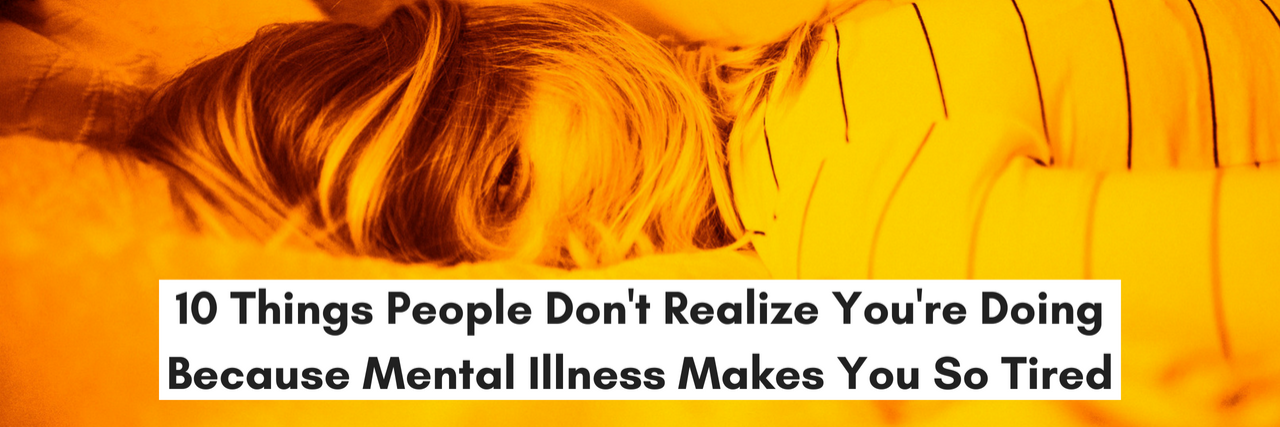10 Things People Don't Realize You're Doing Because Mental Illness Makes You So Tired
“I’m tired of medication, therapy and fighting. I’m tired of being tired. I’m tired of having a mental illness. I’m tired of everything.”
These are the words of Mighty contributor Brooke Bowie, from her piece, “To the People Who Don’t Understand Why Mental Illness Makes Me so Tired.”
If you can relate, you’re not alone. Maybe your mental illness has you stuck in bed and you can’t muster up the strength to face the day. Maybe overthinking and intrusive thoughts are running you ragged. Whatever is making you tired today, we hope you can find some relief today.
If any of this resonates, we want you to know you’re not alone. The only way we can shine a light on how mental illness manifests is to talk about it, so we asked our Mighty community to share one thing people don’t realize they are doing because mental illness makes them tired.
Here’s what they had to say:
1. Neglecting Housework
“Neglecting housework and self-care. It is seen as being lazy by people who aren’t affected, but sometimes just breathing takes all the energy I have.” — Heather M.
“Neglecting housework. Basically doing the bare minimum so that it’s clean enough to be healthy. And feeling tremendously guilty for not being able to keep it at the standard I used to. I swear my house was cleaner when my three oldest kids were toddlers than now, with three teens and a 7-year-old, because my mind was a lot healthier.” — Kristina W.
2. Being Unable to Work Full-Time
“Not working. I do not work. I cannot work. Due to my lack of attendance because of my chronic exhaustion and inability to get out of bed (or off the couch) most days.” — Reba E.
3. Drinking a Lot of Coffee
“Drinking massive amounts of caffeine to combat fatigue from anxiety, depression, and to counteract the sleepiness from medications I take for those conditions as well as fibromyalgia.” — Kerri E.
“Lots of coffee. It doesn’t work on me unless I drink tons of it… Then I don’t sleep, caused by anxiety. Not caffeine. But people blame the coffee.” — Lauren A.
4. Isolating
“Not meeting up with or replying to people. I socially isolate myself because talking is so draining and I can’t always handle it. Even if I do meet someone, after I’ve met up with them I always have to take the following day just to rest afterwards in my room by myself. I hate it because it cuts me off from people, but I’m just so exhausted all the time.” — Nina F.
“Not talking to anyone for days on end. Because my own issues annoy me, they must annoy everyone else. Or I just can’t deal with other people’s issues.” — Alanna J.
5. “Zoning Out”
“Zone out. I’ll just kind of withdraw from a conversation I was holding and zone out, unblinking, [looking] at anything I’d been looking at previously.” — Sam G.
6. Neglecting Self-Care
“Neglecting self-care because once my mental illness kicks itself into overdrive, it has me believing I’m just not worth it no matter what anybody says or does.” — Nichole D.
7. Showing Up Late to Work or Quitting Jobs Frequently
“Leaving work, not showing up or quitting without notice. It’s hard for me to work at the same place for more than a few months to a year with bipolar disorder. But in my hypomania, I’m a great employee and get leadership roles. The down side of me gives up drive and motivation.” — Summer P.
8. Sighing
“Sighing, everyone thinks I’m angry or frustrated all of the time when I’m really just exhausted. It’s even started arguments and then because I’m so tired, I end up a puddle of tears which make everything worse.” — Alyssa P.
9. Talking a Lot
“Talking a lot. People think I just like to talk when I am just trying to silence my mind from constant chatter. The constant chatter in my mind is exhausting. I can sleep for 10 to 12 hours and still be tired.” — Lori F.
10. Losing Your “Train of Thought”
“I lose my train of thought mid-sentence, and often forget very common words. My mind just blanks and I stand there fumbling for the right word.” — Staci B.

